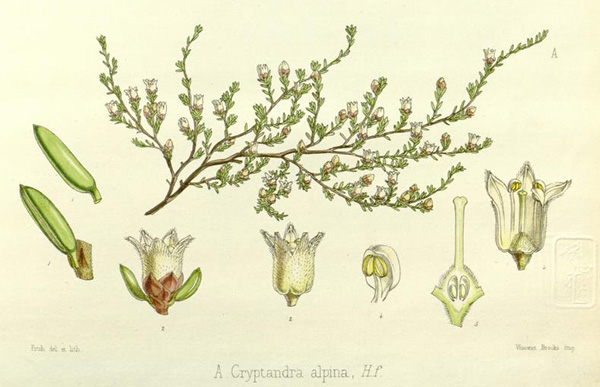Today is the 200th anniversary of the birth of Sir Joseph Dalton Hooker (1817–1911), one of the great botanists and explorers of the 19th century. Son of William Jackson Hooker, he was introduced to plant science early in his life, attending botany lectures of his father at Glasgow University at the age of 7—and he didn’t stop being a botanist from then.
Soon after he obtained a medical degree, he joined the navy and accompanied the scientific expedition of the Erebus and Terror to the Antarctic. This was the first of several expeditions around the world, and probably his most influential. For four years he travelled the southern oceans. On 30 September, 1839 the ships departed Britain and visited Ascension, St Helena, the Cape, Kerguelen, Van Diemen’s Land, New Zealand, Tierra del Fuego and the Falkland Islands, and sailed along a vast extent of the coast of Antarctica. Van Diemen’s Land (Tasmania) was visited twice, during August–October 1840 and March–May 1841, and there was a brief stay at Port Jackson (Sydney). The ships arrived back in England on 4 September, 1843.
Following this expedition, Hooker wrote his monumental The Botany of the Antarctic Voyage of H.M. Discovery Ships Erebus and Terror in 1839–1843, which was published between 1843 and 1859 in six large volumes. It is one of the most important works in Australasian botany, containing Flora Antarctica (2 vols: Lord Auckland Island, Campbell’s Island, Terra del Fuego, Falkland Islands, etc.), Flora Novae Zelandiae (2 vols) and Flora Tasmaniae (2 vols). Each part was introduced with a lengthy essay on the flora and vegetation of the region, especially the introductory chapter on Tasmania is a “milestone essay on biogeography”. Illustrated with numerous colour plates the volumes provided detailed descriptions of over 3000 species, many of which were new to science.

Cryptandra alpina, a Tasmanian endemic shrub described by J.D. Hooker. Flora Tasmaniae plate 12 (1855).
In 1855, Hooker was appointed Assistant-Director of the Royal Botanic Gardens in Kew and later succeeded his father as Director, a post he held for 20 years. Hooker continued to travel and published numerous scientific papers and books (see listing in TL-2). He was a friend and early supporter of Charles Darwin and probably one of the first full-time professional botanists.
From 1862 to 1883 he collaborated with George Bentham (1800–1884), probably the leading systematic botanist of the 19th century, in the preparation and publication of Genera plantarum ad exemplaria imprimis in herbariis kewensibus servata definita, a monumental overview of all families and genera of vascular plants, then known to science. The taxonomic system used in that work is known as the Bentham & Hooker System and was used by generations of botanists.
Hooker’s legacy cannot be underestimated. He is celebrated in the book Imperial nature: Joseph Hooker and the practices of Victorian science by Jim Endersby, a one-day symposium held today, and a concurrent exhibition at the Library, RBG Kew.
More information about Hooker can be found here:
- Australian Dictionary of Bibliography
- Wikipedia
- Plant Explorers
- RBG Kew: Hooker Collection (also described in this article; 1.5mb PDF)
- The Victorian Web
- Nature article by Jim Endersby (22 June 2017)

